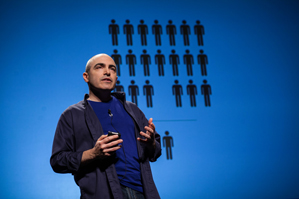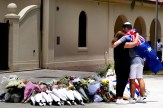Guest Post: Compassion — it does a society good

I’m excited to introduce today’s guest blogger: Lori Lennon, science communications diva. That’s not her official title, just what I like to call her. Really, she’s the communications coordinator for the College of Science and she had the good fortune of attending IDEAS Boston at UMass Boston yesterday to hear psychology David DeSteno talk about compassion. Below she reflects on what she learned. Enjoy!
Yesterday I went to check out professor David DeSteno, our resident expert on social emotions, speak at IDEAS Boston 2012. DeSteno is a compelling speaker, and his research on compassion is so incredibly interesting—I mean, how fascinating is it to study the science behind human emotion? He’s a lucky guy.
Listening to DeSteno’s talk, I could not help but think about my days in the newsroom. I kept thinking about the stressful situations, the insanely tight deadlines, the terrible hours, the arguments about storylines and missed opportunities—the newsroom is filled with emotion, and there are times when arguments can’t be avoided, but despite all that, I can honestly say that some of my nearest and dearest friends are my former co-workers.
But why? You would think that with the day-to-day stresses, we wouldn’t want to spend any more time with each other than necessary, but it was the complete opposite. I spent much of my spare time with my newsroom friends.
It all came together for me during DeSteno’s talk….It’s compassion. Compassion may well have been the bond that kept us all together, and sane, for that matter.
Here’s how DeSteno breaks it down: Humans are capable of great acts of love, but whether we know it or not (or just won’t admit it), we are also capable of greed and selfishness, even if it’s as simple as ignoring the elderly person who could use some help crossing the road, or by not holding the door that extra 5 second for the person behind you.
There is a balance, as DeSteno puts it, between selflessness and selfishness—both feelings exist in the conscious and unconscious mind, but which one emerges at any one moment, depends on our surroundings.
So how do you feel compassion toward one person, but perhaps not another? At IDEAS Boston and at a recent Pop! Tech talk (which was selected as the Talk of the Day) DeSteno used examples such as the Christmas Truce and the embrace between Pres. George Bush and Sen. Tom Daschle after the 9/11 attacks to show how similarities can make us form instant bonds—or feelings of compassion—toward each other.
You’re probably asking how this can be proved. To do just that, DeSteno set up an experiment where subjects tapped either in unison with participants or off tempo. These subjects were then asked if they would help participants finish some sort of daunting task. The results were telling—the subjects who tapped in unison with the participants were more likely to help finish this terrible task assigned than those who tapped asynchronously with each other. Interesting, right? A simple task, such as tapping in unison, is enough to make some people feel compassionate toward others.
So this brings me back to my fabulous friends from the newsroom. Sure we all fought with each other here and there, and yes, things did get hairy at times, but through thick and thin, we were on the same team. We were all working the same god-awful hours, we were all stressing about the same stories, the deadlines and sources, and we were all scarfing down the same stale brownies left on the assignment desk that were probably from some kid’s birthday party over the weekend. All those stresses that we shared brought us together—made us a tighter unit, made us feel compassion toward one another.
I think it makes perfect sense, and it gives me hope that we can use this idea of compassion to create a better understanding of and tolerance for one another.






